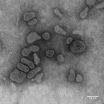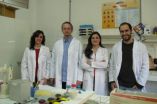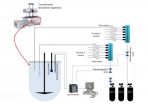(Press-News.org) Heart valve defects are a common cause of death in newborns. Scientists at the University of Bonn and the caesar research center have discovered "Creld1" is a key gene for the development of heart valves in mice. The researchers were able to show that a similar Creld1 gene found in humans functions via the same signaling pathway as in the mouse. This discovery is an important step forward in the molecular understanding of the pathogenesis of heart valve defects. The findings have been published in the journal "Developmental Cell".
Atrioventricular septal defect (AVSD) is a congenital heart defect in which the heart valves and cardiac septum are malformed. Children with Down's syndrome are particularly affected. Without surgical interventions, mortality in the first months of life is high. "Even in adults, unidentified valve defects occur in about six percent of patients with heart disease," says Prof. Dr. Michael Hoch, Executive Director of the Life & Medical Sciences (LIMES) Institute of the University of Bonn.
For years, there have been indications that changes in the so-called Creld1 gene (Cysteine-Rich with EGF-Like Domains 1) increase the pathogenic risk of AVSD. However, the exact molecular connection between the gene and the disease was previously unknown. A research team from the LIMES Institute and the caesar research center in Bonn has now shown, in a mouse model, that Creld1 plays a crucial role in heart development. Researchers at the University of Bonn switched off the Creld1 gene in mice: "We discovered that the precursor cells of the heart valves and the cardiac septum could no longer develop correctly," reports Dr. Elvira Mass from the LIMES Institute. This was an important indication that Creld1 is required at a very early stage for the development of the heart.
In embryonic development, the heart develops as the first organ
"In the embryonic stage, the heart develops as the very first organ. It pumps blood through the vascular system and is essential for supplying other organs of the body with oxygen and nutrients," reports the cooperation partner, Dr. Dagmar Wachten who directs the Minerva research group "Molecular Physiology" at the caesar research center and is engaged in research involving cardiac development. The research team discovered that the Creld1 gene controls the development of heart valves via the so-called calcineurin NFAT signaling pathway. The heart valve defects in mice lacking the Creld1 gene ultimately led to insufficient oxygen supply to the body, causing the mouse embryo to cease development after approximately eleven days.
Potential starting point for improving diagnostic measures
The research team anticipates that the findings can be carried over to patients. With regard to cardiac development, mice and humans are very similar and the Creld1 gene and the calcineurin/NFAT signaling pathway likewise function analogously in both species. "Our results contribute to a better understanding of the molecular basis of heart development and, in the medium-term, to improved diagnosis of unidentified heart valve diseases," explains Prof. Hoch. Interestingly, the calcineurin/NFAT signaling pathway is not only active in the heart but also in immune cells. In transplant medicine, it has to be suppressed over the long-term by drugs such as cyclosporine A so that transplanted organs are not rejected. "Within the scope of the ImmunoSensation Excellence Cluster, we are currently investigating the mechanism of action of Creld1 in immune cells," says Prof. Hoch, who is convinced that it will also be of importance in transplant medicine in the future.
INFORMATION:
Publication: Murine Creld1 controls cardiac development through activation of calcineurin/NFATc1 signaling, Developmental Cell, DOI: 10.1016/j.devcel.2014.02.012
A podcast on this topic is available at: https://www.youtube.com/watch?v=QiAR-peJijs&feature=youtu.be
Contact information:
Prof. Dr. Michael Hoch
Life & Medical Sciences (LIMES) Institute
of the University of Bonn
Tel. 0228/7362737
E-Mail: m.hoch@uni-bonn.de
Web: http://www.limes-institut-bonn.de
Dr. Elvira Mass
Life & Medical Sciences (LIMES) Institute
of the University of Bonn
Tel. 0228/7362767
E-Mail: emass@uni-bonn.de
Dr. Dagmar Wachten
caesar research center, Bonn
Minerva research group leader
Tel. 0228/9656311
E-Mail: dagmar.wachten@caesar.de
Genetic cause of heart valve defects
Researchers at the University of Bonn and the caesar research center identify a new key regulator
2014-03-31
ELSE PRESS RELEASES FROM THIS DATE:
Satellite shows high productivity from US corn belt
2014-03-31
Data from satellite sensors show that during the Northern Hemisphere's growing season, the Midwest region of the United States boasts more photosynthetic activity than any other spot on Earth, according to NASA and university scientists.
Healthy plants convert light to energy via photosynthesis, but chlorophyll also emits a fraction of absorbed light as fluorescent glow that is invisible to the naked eye. The magnitude of the glow is an excellent indicator of the amount of photosynthesis, or gross productivity, of plants in a given region.
Research in 2013 led by Joanna ...
Nearly 97 percent of health professionals wash their hands when patients are asked to watch: Study
2014-03-31
TORONTO, ON, March 31, 2014 --
Improving hand hygiene compliance by healthcare professionals is no easy task, but a first-of-its-kind Canadian study by researchers at Women's College Hospital shows simply asking patients to audit their healthcare professional is yielding high marks.
The study, published in the April edition of the American Journal of Infection Control, details the findings of an 11-month pilot project looking at an alternative method of hand hygiene auditing using the patient-as-observer approach. In this method, patients observe and record hand hygiene ...
Rural versus urban causes of childhood concussion
2014-03-31
Researchers at Western University (London, Canada) have found youth living in rural areas are more likely to sustain concussions from injuries involving motorized vehicles such as all-terrain vehicles and dirt bikes, whereas youth living in urban areas suffer concussions mostly as a result of sports. Hockey accounts for 40 per cent of those injuries. The study which reveals where and how children are receiving concussions is published in the Journal of Trauma and Acute Care Surgery.
Dr. Doug Fraser, a scientist with the Children's Health Research Institute at Lawson ...
Proteins discovered in gonorrhea may offer new approach to treatment
2014-03-31
CORVALLIS, Ore. – Researchers at Oregon State University have discovered novel proteins in, or on the surface of the bacteria that causes gonorrhea, which offer a promising new avenue of attack against a venereal disease that is showing increased resistance to the antibiotics used to treat it.
Only a single, third-generation cephalosporin antibiotic still shows good efficacy against gonorrhea, creating a race against time to find some alternative way to treat this disease that can have serious health effects. It's the second most commonly reported infectious disease in ...
Where to get Viagra news? (Really, this isn't spam)
2014-03-31
RIVERSIDE, Calif. — Do you want information on Viagra or ibuprofen? Check out general social networks such as Twitter and Pinterest. Interested in sleep disorders or depression? You're better off going to specialized health social networks such as WebMD or drugs.com.
That is one of the findings of a just published paper, "Pharmaceutical Drugs Chatter on Online Social Networks," based on an analysis of more than 1 million drug-related posts, by a team of researchers at the University of California, Riverside's Bourns College of Engineering and Zhejiang University in China.
The ...
Biolimus still comparable to everolimus in year 2 of stent match-up
2014-03-31
WASHINGTON (March 31, 2014) — A new stent covered with biodegradable coating continues to show statistical equivalence to Japan's market leader in cumulative second-year data and subgroup analyses, according to research from the NEXT trial presented at the American College of Cardiology's 63rd Annual Scientific Session. NEXT is the largest head-to-head randomized study of these two stents – the novel biolimus-releasing model with the degradable coating (BES) and the everolimus-releasing standard with a durable polymer (EES).
Polymer coatings contain the drugs in drug-eluting ...
Tested a drug that strengthens the analgesic effect of opioids without increasing constipation
2014-03-31
Scientists from the University of Granada have taken part, alongside the Esteve laboratory, in the development of a new drug that multiplies the analgesic effect of opioids (drugs for treating intense pain), without increasing constipation, one of the most common side-effects of these drugs, among which is morphine.
This important scientific breakthrough has been published in The Journal of Pharmacology and Experimental Therapeutics, and has been chosen as its outstanding article in the month of January. So far, the University of Granada researchers have published the ...
Researchers develop device that simulates gastro-intestinal tract
2014-03-31
A breakthrough in drug testing developed by a University of Huddersfield lecturer could lead to cheaper, more effective medicines. Dr Hamid Merchant is a member of the team that has created a device which accurately simulates the gastro-intestinal tract and how it absorbs medication. This means that the cost of clinical trials could be greatly reduced, with savings passed on to customers.
Dr Merchant has joined the University as a Senior Lecturer in Pharmaceutics. Previously a postdoctoral fellow at University College London (UCL), he has extensive research experience, ...
Certain genetic variants may identify patients at higher risk of bladder cancer recurrence
2014-03-31
While patients diagnosed with bladder cancer usually face a favorable prognosis, many experience recurrence after treatment. Because frequent, painful screenings are needed to identify recurrences, the ablility to identify patients at high risk of recurrent cancer could help to improve quality of life for all bladder cancer patients.
A new study published in BJU International, "Genetic polymorphisms modify bladder cancer recurrence and survival in a U.S. population-based prognostic study," suggests that certain inherited DNA sequences may affect a bladder cancer patient's ...
Heparin more effective than bivalirudin in patients during emergency heart procedure
2014-03-31
WASHINGTON (March 31, 2014) — In a comparison of two blood-thinning medications, heparin was associated with significantly fewer major cardiovascular events at 28 days than bivalirudin in patients receiving primary percutaneous coronary intervention after a heart attack, according to research presented at the American College of Cardiology's 63rd Annual Scientific Session.
The single-center, open label trial enrolled 1,829 patients with suspected heart attack who received a coronary angiography, an imaging test to see how blood flows through the heart. Patients were randomized ...
LAST 30 PRESS RELEASES:
Highly stable self-rectifying memristor arrays: Enabling reliable neuromorphic computing via multi-state regulation
Composite superionic electrolytes for pressure-less solid-state batteries achieved by continuously perpendicularly aligned 2D pathways
Exploring why some people may prefer alcohol over other rewards
How expectations about artificial sweeteners may affect their taste
Ultrasound AI receives FDA De Novo clearance for delivery date AI technology
Amino acid residue-driven nanoparticle targeting of protein cavities beyond size complementarity
New AI algorithm enables scientific monitoring of "blue tears"
Insufficient sleep among US adolescents across behavioral risk groups
Long COVID and recovery among US adults
Trends in poverty and birth outcomes in the US
Heterogeneity of treatment effects of GLP-1 RAs for weight loss in adults
Within-person association between daily screen use and sleep in youth
Low-dose lithium for mild cognitive impairment
Catheter ablation and oral anticoagulation for secondary stroke prevention in atrial fibrillation
A new theory of brain development
Pilot clinical trial suggests low dose lithium may slow verbal memory decline
Bioprinting muscle that knows how to align its cells just as in the human body
A hair-thin fiber can read the chemistry of a single drop of body fluid
SwRI develops magnetostrictive probe for safer, more cost-effective storage tank inspections
National report supports measurement innovation to aid commercial fusion energy and enable new plasma technologies
Mount Sinai, Uniformed Services University join forces to predict and prevent diseases before they start
Science of fitting in: Do best friends or popular peers shape teen behavior?
USF study: Gag grouper are overfished in the Gulf; this new tool could help
New study from Jeonbuk National University finds current climate pledges may miss Paris targets
Theoretical principles of band structure manipulation in strongly correlated insulators with spin and charge perturbations
A CNIC study shows that the heart can be protected during chemotherapy without reducing antitumor efficacy
Mayo Clinic study finds single dose of non-prescribed Adderall raises blood pressure and heart rate in healthy young adults
Engineered immune cells show promise against brain metastases in preclinical study
Improved EV battery technology will outmatch degradation from climate change
AI cancer tools risk “shortcut learning” rather than detecting true biology
[Press-News.org] Genetic cause of heart valve defectsResearchers at the University of Bonn and the caesar research center identify a new key regulator




